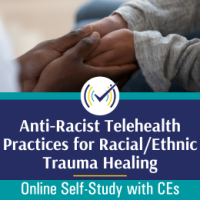This course does not offer CE Credits. The same course is available for purchase and offers 1 CE hours for behavioral health clinicians. See "related products" below.
The goal of this presentation is to deepen the participants’ understanding of the experience of Racial/Ethnic Stress and Trauma of clients who identify as Black, Indigenous, and People of Color (BIPOC) as they access and engage in behavioral health services provided through telehealth during this time of the COVID-19 and racism pandemics (Cheng & Conca-Cheng, 2020). Within the context of the growing prevalence of racial discrimination among BIPOC communities and its consistent relationship with Racial/Ethnic Stress and Trauma; this presentation will highlight existing trauma-focused, evidence-based, and community-centered practices that can be tele-adapted to help BIPOC clients heal in their racial/ethnic trauma. Finally, strategies for effective assessment and intervention of racial/ethnic trauma using video, audio/phone, app-based, and internet platforms will be discussed.
This is a non-interactive self-study course.
Instruction consists of 1.5 hours of video instruction and a course evaluation.
From the time of registration, you have six months to access the coursework.
Upon completion of this training, professionals will be able to do the following:
Learning Objectives:
Define racial trauma within the context of behavioral health assessment and intervention of BIPOC clients.
Identify and describe at least two ways of addressing telehealth inequities and the digital divide when working with BIPOC clients.
Illustrate at least two methods of culturally-adapting trauma-focused interventions using telehealth platforms when working with BIPOC clients who present with racial/ethnic trauma.
Ritchie Rubio Ph.D.
Ritchie Rubio Ph.D. Clinical Psychologist has and works as a clinical child psychologist, play and expressive arts therapist, researcher-storyteller, program evaluator, statistical consultant, data analyst, telehealth trainer/consultant, and associate professor/lecturer in a variety of clinical and academic settings including public health systems, universities, pediatric hospitals, community mental health settings, schools, and research institutes in three countries: the Philippines, U.S.A., and New Zealand. Dr. Rubio moved from the Philippines at the age of 25, completed his Ph.D. in Clinical Psychology with a Child and Family emphasis from the California School of Professional Psychology (CSPP) through a Ford Foundation International Fellowship Program (IFP) grant. He is currently the Director of Practice Improvement and Analytics of the Children, Youth, and Families System of Care (CYF-SOC) Behavioral Health Services (BHS) at the San Francisco Department of Public Health in California, USA. In that role, he plans and coordinates a clinical practice improvement and evaluation program focused on identifying best trauma-informed and diversity-responsive practices; and utilizing implementation science to design and strengthen clinical assessment and interventions. He is also an adjunct Associate Professor at the Counseling Psychology programs of the University of San Francisco and the Berkeley Wright Institute. He teaches courses such as Research and Statistics; Crisis and Trauma Counseling; Neuroscience; Child and Adolescent Counseling; Family Violence and Protection; Individual, and Family Development; and Clinical Assessment and Measures. His clinical work was/is primarily with immigrant and multicultural children/youth and their families. He mostly integrates psychodynamic, attachment, family systems, multicultural, expressive arts, play therapy, and CBT orientations.
This course does not offer CE credits, just great content.
The same course is available for purchase and offers 1 CE hour for behavioral health clinicians. See "related products" below.
Participants may request a printed version of their certificate of attendance to be delivered by mail. A shipping/handling fee of $6.95 will be charged per request. Shipping internationally may require an additional charge.
This is a non-interactive, self-study course.
To receive your certificate of attendance you must complete the course in its entirety.
To complete a Training Video Course, one must register, log in, select the My Courses option from the menu items, click the Course Title, attend to the video content, and complete the course evaluation, then claim the certificate of attendance.
You can download or print your certificate of completion by logging into your account, navigating to the course by selecting the My Courses option from the menu items, clicking the Course Title, scrolling to the Certificate of Completion section, and clicking on the Certificate of Completion link to either download it or print it.
Participants may request a printed version of their certificate of completion to be delivered by mail. A shipping/handling fee of $6.95 will be charged per request. Shipping internationally may require an additional charge.
Directions for completing a course can be found by clicking here.
This course is intended for clinicians who provide behavioral health services.
This is a non-interactive self-study course. Teaching methods for this course include recorded lectures, videos, a post-test, and a course evaluation.
This course was recorded 3/22/22



